Interview Patric Leitner: "In Luge, You Have to Give Your All for great results"
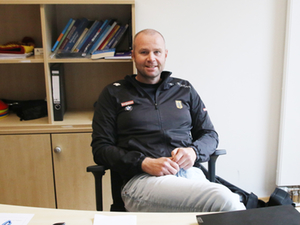
Berchtesgaden (FIL/24 Oct 2024) The new head coach of the German luge team, Patric Leitner, is looking forward to his first season at the helm of the team. The 2024/2025 pre-Olympic luge season is just around the corner, and Leitner, who has taken over from Norbert Loch, is highly motivated. “I'm really looking forward to it, it's a very appealing task and I'm ready,” said the 2002 Olympic champion.
However, his road back to everyday life as a coach was anything but easy. After a complicated leg fracture in January that forced him to undergo two surgeries and 16 weeks of rehab, he is now fit again and ready to lead his team successfully into the upcoming season. We talked to Patric Leitner about his fresh start, the challenges ahead, and his expectations for the season.
Mr. Leitner, how do you feel, just before your first season as the new head coach of the German team?
Patric Leitner: “At the beginning, I had a few sleepless nights because it still feels a bit strange. But you grow with the task and now it's going well. It's a lot of responsibility. But I have a reliable team behind me. There is a lot of communication within the team and that's very important to me. I'm sure we'll rock the season as a team!”
Your start was a bit rough because you broke your leg playing badminton in January during the ITW in Altenberg. How was the road back and then to the top of the German team as head coach?
Patric Leitner: “The road was hard. Everything in my leg was broken: the tibia and fibula were broken, and the ankle was totally destroyed. I had my first operation in Dresden. After that, my leg was in a fixator. A terrible thing. I had a second surgery in Munich by our team doctor Florian Dreyer. I wasn't allowed to perform for 16 weeks and ended up sleeping on the couch at home. I couldn't even get up the stairs to the bedroom with crutches. My wife Jeanette had to bring me everything. I was totally dependent and also mentally affected when everyone else was able to do sports outside in nice weather and I was lying on the couch for weeks. In rehab, I then had to learn how to walk again. Fortunately, we have an excellent network of doctors and physiotherapists at the BSD (German Federation). My goal was to be able to walk again by the training camp at Lake Garda in June.”
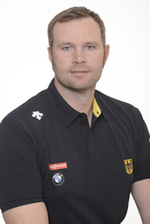
And did you succeed?
Patric Leitner: “Yes, it was great. After 16 years, we held our first summer training camp together with the whole team at Lake Garda in Italy. The goal was to push ourselves to the limit together, support each other and grow together as a team. We did via ferrata, tried our hand at canyoning and rode e-bikes together a lot. It was great and brought us closer together as a team. It was important to me that everyone helps each other and sticks together. That's what I've made my goal for our team. I want to bring our team together from all over Germany!”
How did the preparation go? Are all the top athletes healthy and fit before the season?
Patric Leitner: “Everyone got through the summer well and stayed healthy. We made a change in our athletic training this year and trained more at the start again. We had some technique blocks. That was good. We want to keep it that way because you can see a development. Luge is getting harder and harder. Many nations work very professionally and are now athletically strong. The competition never sleeps and that's good for the sport and makes luge more interesting internationally. But we definitely have to work hard and improve athletically to stay on the ball. We are looking forward to exciting races.”
Has the international competition become stronger in recent years?
Patric Leitner: “Absolutely! The sport of luge has developed extremely. The international competition is very strong. You always have to perform at your best and give your all if you want to finish at the front. In the men's singles, it's the toughest business. There are so many strong athletes internationally. But that's also what makes it so exciting and a new challenge every week.”
Two years ago, it was leaked that you had a particularly lucrative offer from a neighboring country. Why did you turn it down?
Patric Leitner: “You know that I am passionate about the sport of luge and about our athletes. The offer was very good, but I owe a lot to the BSD (German federation) and I care about our athletes. Ultimately, I wanted to continue in Germany. It is particularly important to me that we act as a team.”
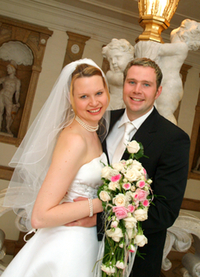
What do your wife and children think about you being head coach now?
Patric Leitner: “My wife Jeanette said: ‘You can do it!’ She never doubted me and, in the end, what counts is that I was always on the road as a coach before. That won't change now. My son Luis is 15 and my daughter Leni is 10 years old. They were happy that I stayed in Germany and didn't become a coach abroad. They don't know what the new job entails, and they don't really care either.”
You were previously the athletic trainer at the Berchtesgaden-Königssee base. What's going to happen there now? Is there a successor?
Patric Leitner: “I would like to continue with athletics until 2026. Normally, I would have swapped with Norbert Loch. He is now responsible for the base in Berchtesgaden-Königssee. But I have been working with my athletes for so long now. I want to continue until the next Olympic Games. I also want to break new ground athletically with the whole team. I have already introduced separate training sessions for women and men in the summer. The athletes are now realizing that everyone is doing the same thing and that they are not training differently at the different bases. They can measure themselves better and also work together. The atmosphere at the training sessions in the summer was better than ever. All the ladies and all the men communicate with each other. There are specific training sessions in small groups where we address each individual. It is important to me that the team works and that I, as a trainer, have to work with them and not sit in the office. With so many people, you won't always be able to please everyone, so I'm always happy to receive feedback from the athletes and gladly accept it when they suggest changes.”
How will you nominate your World Cup team?
Patric Leitner: “We have planned four selection races for the World Cup team. Nobody is set for the World Cup, everyone has to go through the qualifiers, the first of which will take place in Sigulda on October 25.”
Is that a new concept? In the past, the World Cup qualifiers were usually held on the German tracks, unless a World Championship or Olympic track was already available in October or November.
Patric Leitner: “We will have four selection races altogether and start in Sigulda because there is already ice there. The tracks in Germany are iced later than they used to be to take climate change into account. After that, there will be one more World Cup qualification race each on the three German tracks. Each athlete can drop one race. The three best results will be counted.”
Which athletes will compete in the first selection race in Sigulda?
Patric Leitner: “We have a very large team in Latvia. The best juniors and the B team are also there. So there will be 28 athletes in Sigulda in total. I want to give everyone the chance to be there. It's important that everyone has the same conditions. The young ones learn from the experienced ones. This is a new approach, but it is important to me and the entire team of coaches agreed at the coaches' council. Until Christmas, we will also have the B team in the World Cup. They will compete in the Nations Cups in Lillehammer, Igls and Oberhof. I think it's important that those who don't qualify for the World Cup team can also gain international experience in the Nations Cup. They can see where they stand and are integrated into the team. That was my wish. In the second half of the season and especially when we go overseas, our B team will be on the German tracks again. Then it's back to doing the volumes with many runs on the tracks.”
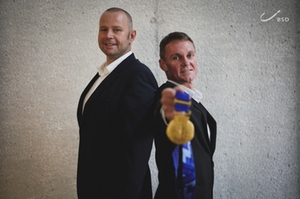
You were also in Lillehammer for a week at the beginning of October, but that was not an official training session for your team. Nevertheless, you gained some first impressions. How did the two “new” doubles Dajana Eitberger/Magdalena Matschina in the women's doubles and Toni Eggert/Florian Müller in men's doubles perform?
Patric Leitner: “The conditions in Lillehammer were great. The ice was very good. However, we haven't had an official training session yet. The training on ice was organized and financed by the regional associations.
Dajana and Magdalena luged well in Lillehammer, they get along very well and had fun together.
Toni Eggert and Florian Müller are highly motivated. Of course, they still have to find each other, but they are already very good at the start and if they hit the track, they are also very fast. It's great to have three strong doubles again. It gives everyone a boost, and for the Tobis (Wendl/Arlt) and Hannes Orlamünder and Paul Gubitz, it's great.”
Regarding Patric Leitner:
In May 2024, 47-year-old Patric Leitner from Marktschellenberg in Berchtesgadener Land succeeded the long-standing German national headcoach Norbert Loch. He thus followed in big footsteps. Loch won 22 Olympic and nearly 100 World Championship medals with his team.
Leitner has been working as a luge coach since the 2010/2011 season. He started out at the Federal Police Sports School in Bad Endorf and later became athletic trainer for the Bavarian and national teams at the German Bobsleigh, Luge and Skeleton Federation (BSD).
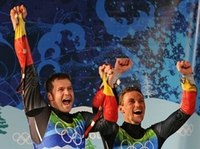
Sporting successes:
Together with Alexander Resch, the duo Leitner / Resch won the overall doubles' World Cup seven times (1999/2000, 2001/02, 2003/04, 2005/06, 2006/07, 2007/08 and 2009/10) and also made five more appearances on the podium in the overall World Cup. The two Bavarians have a total of 34 World Cup victories, were four-time World Champions in the doubles and became Olympic Champions in Salt Lake City in 2002 and took Olympic bronze in Vancouver in 2010 at the end of their career.
Thank you very much Patric Leitner!
photos: private and BSD









